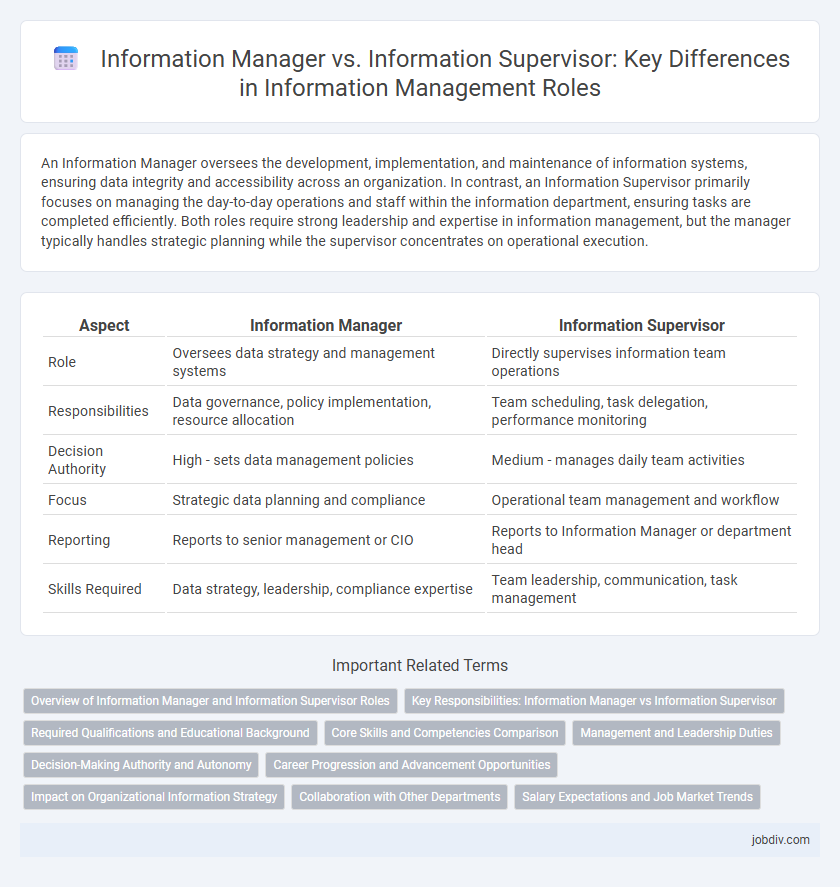An Information Manager oversees the development, implementation, and maintenance of information systems, ensuring data integrity and accessibility across an organization. In contrast, an Information Supervisor primarily focuses on managing the day-to-day operations and staff within the information department, ensuring tasks are completed efficiently. Both roles require strong leadership and expertise in information management, but the manager typically handles strategic planning while the supervisor concentrates on operational execution.
Table of Comparison
| Aspect | Information Manager | Information Supervisor |
|---|---|---|
| Role | Oversees data strategy and management systems | Directly supervises information team operations |
| Responsibilities | Data governance, policy implementation, resource allocation | Team scheduling, task delegation, performance monitoring |
| Decision Authority | High - sets data management policies | Medium - manages daily team activities |
| Focus | Strategic data planning and compliance | Operational team management and workflow |
| Reporting | Reports to senior management or CIO | Reports to Information Manager or department head |
| Skills Required | Data strategy, leadership, compliance expertise | Team leadership, communication, task management |
Overview of Information Manager and Information Supervisor Roles
Information Managers oversee data governance, strategy implementation, and information system optimization to ensure accurate and secure data flow within organizations. Information Supervisors focus on monitoring daily information operations, guiding team performance, and maintaining data quality control standards. Both roles prioritize effective information management but differ in scope, with Managers handling strategic oversight and Supervisors managing operational execution.
Key Responsibilities: Information Manager vs Information Supervisor
Information Managers oversee the strategic planning, development, and implementation of information systems to optimize data management and security across organizations. Information Supervisors focus on the day-to-day monitoring, maintenance, and coordination of information processing activities, ensuring accuracy and compliance with data policies. The Information Manager prioritizes long-term data governance and technological integration, whereas the Information Supervisor emphasizes operational workflow and team supervision.
Required Qualifications and Educational Background
Information Managers typically require a bachelor's degree in Information Technology, Business Administration, or related fields, coupled with experience in data management and project leadership. Information Supervisors often hold similar educational qualifications but may prioritize hands-on technical skills and team coordination experience over formal management training. Both roles benefit from certifications such as PMP or ITIL, enhancing their ability to oversee information systems effectively.
Core Skills and Competencies Comparison
Information Managers excel in strategic planning, data governance, and cross-departmental collaboration, demonstrating strong leadership and advanced analytical skills crucial for overseeing complex information systems. Information Supervisors emphasize operational expertise, team management, and workflow optimization, ensuring efficient data processing and adherence to information security protocols. Both roles require proficiency in information technology, but managers focus on high-level decision-making while supervisors concentrate on day-to-day execution and staff coordination.
Management and Leadership Duties
Information Managers oversee data strategy, coordinate information systems, and lead teams to ensure accurate data flow and compliance with organizational goals. Information Supervisors focus on direct team supervision, monitoring daily information processing tasks, and implementing management policies to maintain workflow efficiency. Both roles require leadership skills, but Information Managers emphasize strategic planning while Supervisors prioritize operational execution.
Decision-Making Authority and Autonomy
An Information Manager typically holds greater decision-making authority, overseeing strategic information policies and resource allocation to optimize data management processes. In contrast, an Information Supervisor manages day-to-day operations with limited autonomy, primarily executing guidelines set by higher management. The Manager's role involves independent decision-making and long-term planning, whereas the Supervisor focuses on operational control and team supervision within established parameters.
Career Progression and Advancement Opportunities
Information Managers typically oversee data management strategies and lead teams, positioning them for higher executive roles such as Chief Information Officer (CIO). Information Supervisors focus on daily operational oversight and team coordination, serving as a crucial step toward managerial positions. Advancing from Information Supervisor to Information Manager often involves gaining strategic planning experience, project management skills, and broader organizational insight.
Impact on Organizational Information Strategy
An Information Manager develops and implements organizational information strategies, ensuring alignment with business goals and optimizing data management practices. An Information Supervisor oversees daily information operations, focusing on maintaining data accuracy, security, and compliance with established strategies. The Information Manager influences long-term strategic planning, while the Information Supervisor ensures effective execution and operational control.
Collaboration with Other Departments
Information Managers coordinate cross-departmental projects by integrating data workflows and ensuring seamless communication between teams such as IT, marketing, and finance. Information Supervisors oversee day-to-day collaboration, facilitating information exchange and resolving operational issues to maintain effective interdepartmental cooperation. Both roles emphasize optimizing data sharing practices to enhance organizational efficiency and decision-making.
Salary Expectations and Job Market Trends
Information Managers often command higher salary expectations than Information Supervisors due to their broader strategic responsibilities and decision-making roles in managing organizational data. Job market trends indicate increasing demand for Information Managers as companies seek expertise in data governance, while Information Supervisors remain vital for overseeing daily operations and ensuring data integrity. Salary ranges typically reflect this dynamic, with Information Managers earning an average of 15-25% more depending on industry and experience.
Information Manager vs Information Supervisor Infographic

 jobdiv.com
jobdiv.com